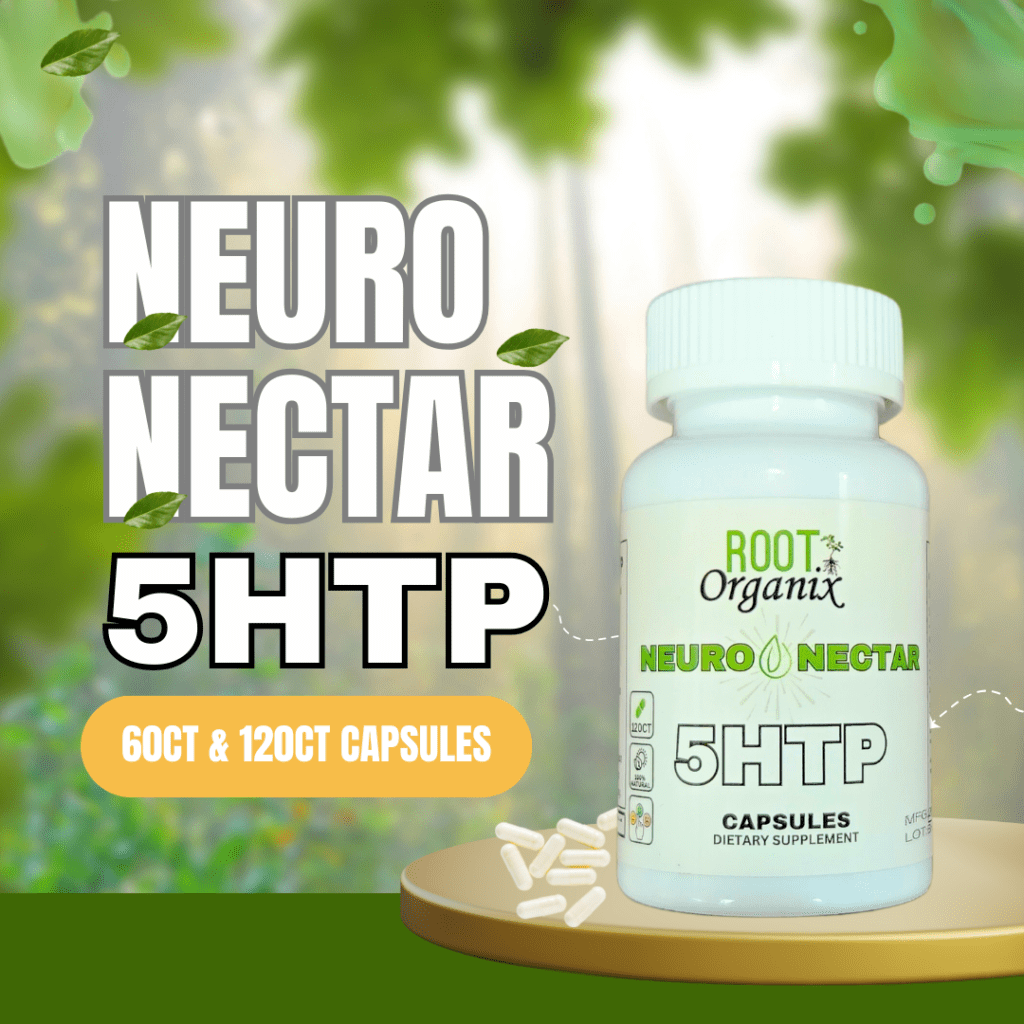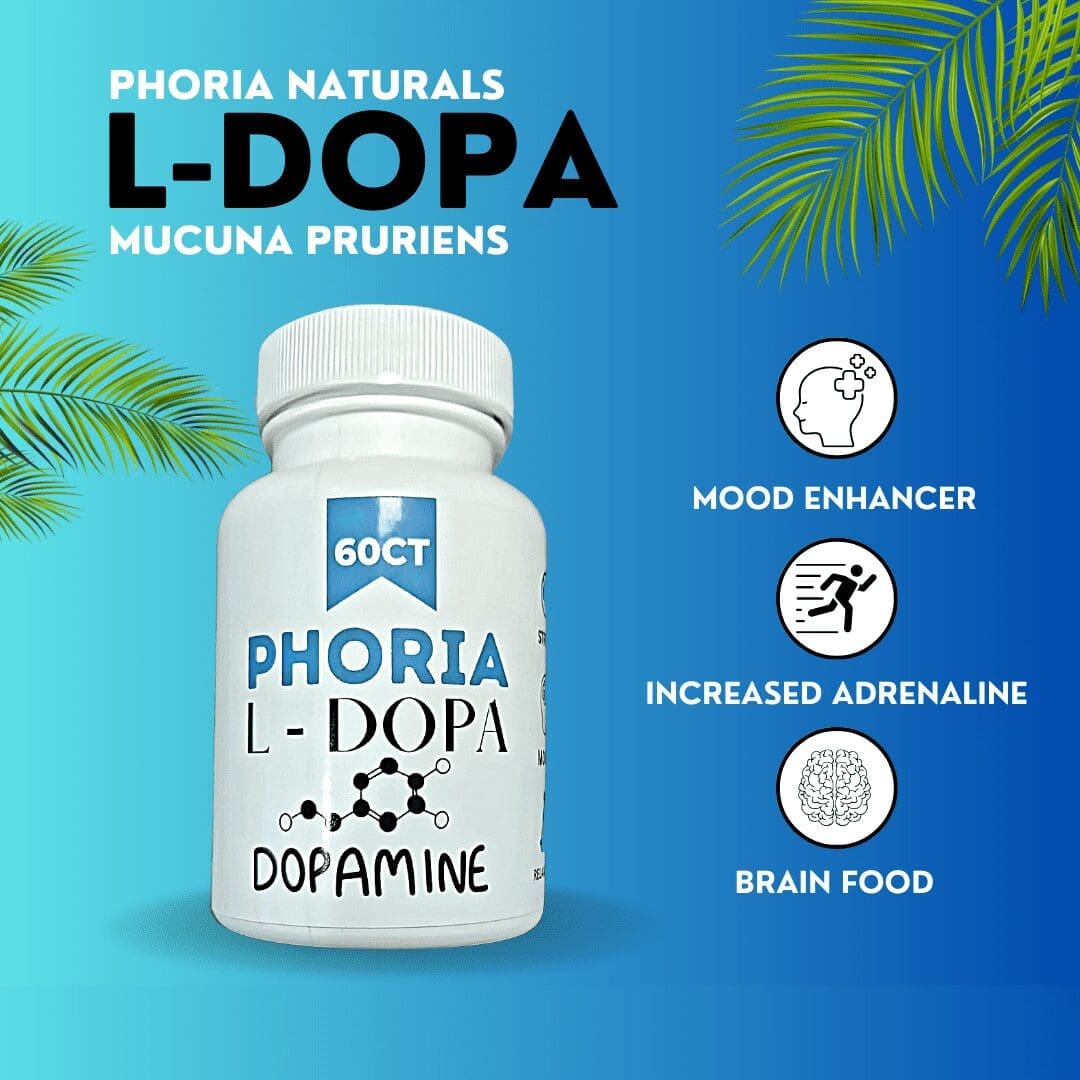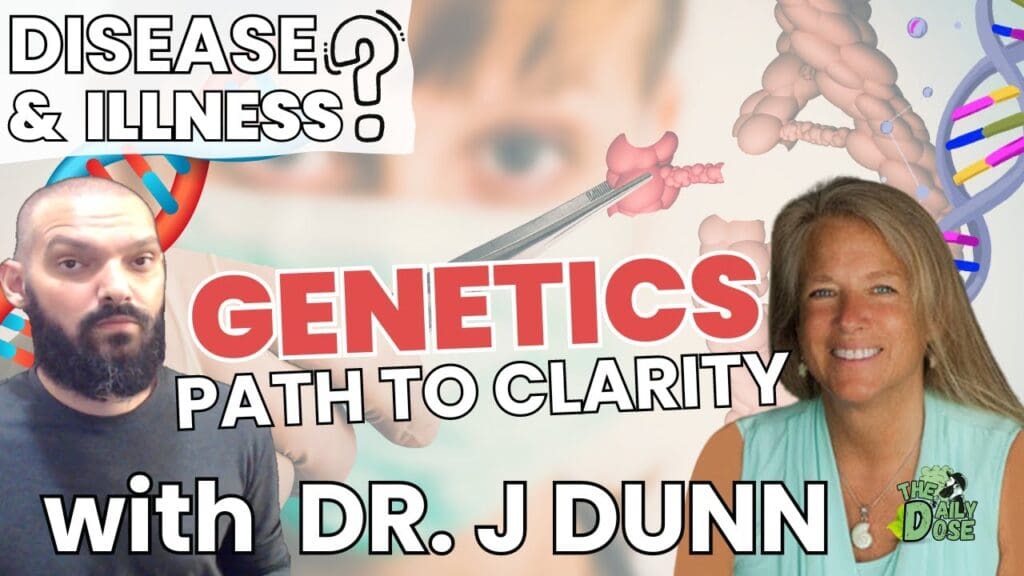Listen to the full episode here: The Daily Dose Podcast
Disease And Illness Redefined With Dr. J Dunn
Table of contents
- Disease And Illness Redefined With Dr. J Dunn
- In My Own Words
- About Doctor J Dunn
- 1. Introduction:
- 2. The Power of Genetic Coding
- 3. Genetic Insights into Disease
- 4. Technology Shaping Genomic Understanding
- 5. Applications in Precision Medicine
- 6. The Genomic Revolution in Disease Prevention
- 7. Challenges and Ethical Considerations
- 8. Future Prospects and Research Frontiers
- 9. Conclusion: Embracing the Genomic Revolution for a Healthier Future
- FAQs
In My Own Words
When we think of being sick or come down with some type of disease we all tend to believe it’s the end of the road. Medication is what comes next for the rest of our lives. We all know there is something wrong with our medical system, it’s been a topic of discussion for decades within our country.
Every year Congress discusses ways to lower costs and improve inclusiveness to allow more coverage of the population. The data is out and it’s clear as day something needs to change, based on the information the U.S. in 2021 alone spent $4.3 Trillion on healthcare costs. If you look at the data decade over decade it has only gone up exponentially since the 60’s.
The fundamental issues specifically lie with the fact we aren’t getting any healthier no matter how much we spend. In fact it’s quite the opposite, we are getting sicker and the question becomes why is that.
Today I have a special guest on the podcast, Dr. J Dunn to discuss new methods for identifying the underlying causes of ailments and their potential treatment options. This is some what new and isn’t taken as seriously as traditional medicine is because of one specific reason. This one reason happens to be because doctors across the country are bound to a set of standards determined by Government and Insurance Companies.
About Doctor J Dunn
Dr. Dunn has a degree in natural sciences and a doctorate in chiropractic medicine as well as certification in functional medicine. She is the originator of Wholistic Kinesiology®, Wholistic Methylation and MyHappyGenes, and she holds a certification in Kinesionics, Touch for Health and Brain Gym and have been trained in Educational Kinesiology, Contact Reflex Analysis, Applied Kinesiology, Functional Medicine and the Brimhall Technique.
She has been a health care provider since 1988, her patients include Olympic athletes, film stars, and CEO’s of multinational corporations. Dr. Dunn teaches Wholistic Methylation® across the country and is a lecturer for various supplement companies in the United States and abroad. In addition, Dr. Dunn has published 2 books, Wholistic Kinesiology and Perfect Health in Paradise.

1. Introduction:
Unraveling the Mysteries of Genetics
In the age of rapid scientific advancement, the exploration of genetics has emerged as a beacon of hope in redefining our understanding of disease, illness, and the pathways to recovery. The decoding of the human genome has opened a door to unparalleled insights into the intricate workings of our biological foundation. With cutting-edge technologies paving the way, we are witnessing a transformative genomic revolution that promises to reshape healthcare on an unprecedented scale.
The Dawn of a Genomic Revolution
As we delve into the profound implications of genetic revelations, it becomes evident that we stand at the threshold of a new era—one where diseases are not merely diagnosed based on symptoms but are decoded at their very core. This article embarks on a comprehensive journey through the intricate landscape of genetics, exploring how advancements in genetic coding, sequencing, and understanding are providing us with an unparalleled view of the root causes of every known disease.

2. The Power of Genetic Coding
Decoding the Blueprint: Understanding Genetic Coding
The human genome, a complex and vast sequence of genetic information, holds the key to unraveling the mysteries of our health. At the core of this revolution is the understanding of genetic coding—the language that dictates the formation and function of every cell in our bodies. As researchers decode this intricate blueprint, they unveil the secrets hidden within our DNA, paving the way for a more nuanced comprehension of health and disease.
How Genetic Sequencing Reveals Disease Predispositions
Genetic sequencing, once an arduous and time-consuming process, has undergone a revolutionary transformation. The advent of high-throughput sequencing technologies has allowed scientists to rapidly decipher entire genomes, providing detailed information about an individual’s genetic makeup. This ability to unravel the genetic code enables us to identify predispositions to various diseases, offering a proactive approach to healthcare.

3. Genetic Insights into Disease
The Landscape of Genetic Contributions to Various Diseases
Our genes play a pivotal role in shaping our health, influencing susceptibility to a myriad of diseases. From hereditary conditions to complex disorders influenced by multiple genes, the genetic landscape is diverse and intricate. Understanding how genetic variations contribute to diseases such as cancer, cardiovascular disorders, and neurodegenerative conditions is at the forefront of genomic research.
Identifying Genetic Markers: A Breakthrough in Precision Medicine
Advancements in genomic research have led to the identification of specific genetic markers associated with various diseases. These markers serve as crucial signposts, guiding clinicians in tailoring treatments based on an individual’s genetic profile. Precision medicine, empowered by these breakthroughs, is revolutionizing the approach to disease management, offering more effective and targeted interventions.

4. Technology Shaping Genomic Understanding
CRISPR and Gene Editing: Transforming the Future of Medicine
The revolutionary CRISPR-Cas9 technology has catapulted gene editing into the spotlight. With the ability to precisely modify DNA sequences, CRISPR offers unprecedented potential for treating genetic disorders at their source. The implications of this technology extend beyond therapeutic interventions, encompassing applications in agriculture and disease prevention.
Advanced Genetic Technologies and Their Applications
Beyond CRISPR, an array of advanced genetic technologies is contributing to our expanding genomic toolkit. From single-cell sequencing to synthetic biology, these innovations are pushing the boundaries of what is achievable in the realm of genetics. As technology evolves, so too does our ability to unravel the complexities of the human genome.

5. Applications in Precision Medicine
Tailoring Treatments Based on Individual Genetic Profiles
The concept of one-size-fits-all treatments is evolving into a more personalized approach. Precision medicine, grounded in genomic insights, tailors medical interventions to the unique genetic makeup of each individual. This shift represents a paradigm change, offering the potential for more effective and targeted therapies with fewer side effects.
Personalized Medicine: A Paradigm Shift in Healthcare
The era of personalized medicine is dawning, where treatment plans are not just informed by symptoms but by the individual’s genetic blueprint. This paradigm shift has the potential to revolutionize the efficacy of treatments, enhance patient outcomes, and reduce the burden on healthcare systems. As we embrace this transformation, the traditional boundaries of medical care are being redefined.

6. The Genomic Revolution in Disease Prevention
Early Detection and Intervention Through Genetic Screening
Genomic insights extend beyond treatment to encompass disease prevention. Genetic screening allows for the early detection of predispositions to certain conditions, enabling proactive measures to mitigate risks. From identifying cancer susceptibility genes to predicting cardiovascular risks, genetic screening is a powerful tool in the arsenal of preventive medicine.
Preventive Measures Informed by Genetic Insights
Armed with knowledge about genetic predispositions, individuals can adopt preventive measures tailored to their unique risk profiles. Lifestyle modifications, early screening, and personalized interventions contribute to a proactive healthcare approach, transforming the narrative from reactive treatment to preemptive health management.

7. Challenges and Ethical Considerations
Navigating the Ethical Landscape of Genetic Information
The vast reservoir of genetic information raises ethical considerations that demand careful navigation. Issues surrounding consent, data privacy, and the potential misuse of genetic data underscore the importance of establishing robust ethical frameworks. As we harness the power of genetics, a responsible and ethical approach is paramount to ensure the trust and well-being of individuals.
Addressing Privacy Concerns in Genomic Medicine
With the wealth of sensitive information contained in genetic data, safeguarding privacy is a critical concern. Striking a balance between advancing research and protecting individual privacy requires ongoing dialogue and the implementation of stringent privacy protocols. As the field progresses, ethical considerations must evolve in tandem.

8. Future Prospects and Research Frontiers
Uncharted Territories: What Lies Ahead in Genomic Research
The genomic revolution is an ever-evolving journey, and the horizons of genetic research continue to expand. From understanding the intricacies of epigenetics to exploring the role of non-coding RNA, the future holds uncharted territories that promise to deepen our understanding of the genomic landscape. Collaborative research endeavors and interdisciplinary approaches are key to unlocking the full potential of genomic science.
Collaborative Efforts and International Initiatives
The global nature of genomic research necessitates collaborative efforts and international cooperation. Initiatives like the Human Genome Project laid the foundation, and ongoing collaborations are essential for advancing research, sharing insights, and addressing global health challenges. As we embark on shared genomic frontiers, the collective knowledge gained has the potential to transform healthcare worldwide.

9. Conclusion: Embracing the Genomic Revolution for a Healthier Future
In concluding our exploration of the genomic revolution, it is clear that we are at the cusp of a transformative era in healthcare. The intricate dance of genes, environment, and lifestyle is unveiling itself with unprecedented clarity. Embracing the power of genomics holds the promise of a healthier future, where diseases are understood at their roots, treatments are tailored to individuals, and preventive measures are personalized and proactive.
FAQs
Genetic coding, the sequence of DNA that dictates the structure and function of our cells, is central to understanding diseases. By decoding genetic information, researchers can identify variations linked to disease predispositions, offering insights into the root causes of various conditions.
While CRISPR technology shows immense potential for treating genetic disorders, its application is not universal. The feasibility depends on the specific nature of the genetic mutation and the target cells. Ongoing research is exploring the broadening applications of CRISPR in diverse genetic conditions.
Genetic screening enables the early detection of genetic predispositions to diseases. This information empowers individuals to adopt preventive measures and undergo regular screenings, contributing to proactive health management and reducing the risk of disease development.
Privacy concerns in genomic medicine revolve around the sensitive nature of genetic data. Issues include the potential misuse of data, consent for genetic testing, and the need for stringent privacy protocols. Ethical considerations and regulatory frameworks are essential to address these concerns.
Individuals can contribute to genomic research by participating in research studies, sharing their genetic data responsibly, and staying informed about the ethical implications of genomic advancements. Support for collaborative efforts and engagement in public discourse also play crucial roles in advancing genomic science.
Challenges in implementing personalized medicine include the need for extensive genetic data, ethical considerations, and addressing disparities in access to genomic technologies. Overcoming these challenges requires continued research, policy developments, and public awareness campaigns to promote equitable access to personalized healthcare.
Related Articles:
- What Is Histamine Intolerance Explained
- Left Sided Chest Pain: Guided Heart Health
- Guide to Cardiovascular Health: Statins
- Plant Medicines For Health And Wellness
Meet The Author






This is such a fascinating episode, thanks Mike! I have been following you on your podcast journey for years now, your doing great work. If you ever have Dr. Dunn back on the show can you please ask about how she has treated addiction using her method. She glossed over it briefly but I’d love to know more. Thanks!
Great information shared.. really enjoyed reading this post thank you author for sharing this post .. appreciated